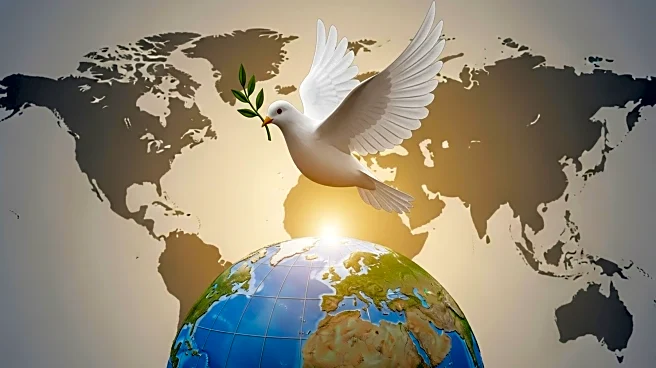What is the story about?
What's Happening?
High-stakes negotiations between Israel and Hamas are currently underway in Egypt, following Hamas's conditional acceptance of a U.S.-backed proposal to end the ongoing conflict in Gaza. The framework, introduced by President Trump, outlines a 20-point plan that includes the phased withdrawal of Israeli forces, the return of hostages, and the disarmament of Hamas. The proposal also suggests the formation of a government of Palestinian technocrats to manage Gaza's affairs under international supervision. Key issues remain unresolved, such as the disarmament process, the timeline for Israeli withdrawal, and the governance structure for Gaza. The plan aims to avoid the forced displacement of Palestinians and includes an economic development initiative to rebuild Gaza.
Why It's Important?
The proposed ceasefire framework is significant as it seeks to address longstanding issues between Israel and Hamas, potentially paving the way for peace in the region. The plan's emphasis on economic development could lead to improved living conditions in Gaza, while the disarmament of Hamas is crucial for Israel's security concerns. The involvement of international stakeholders, including Qatar and Turkey, highlights the global interest in resolving the conflict. Successful implementation could stabilize the region, reduce hostilities, and foster cooperation among Middle Eastern countries. However, the plan's success depends on overcoming political and logistical challenges, particularly regarding the role of the Palestinian Authority and the disarmament process.
What's Next?
The next steps involve detailed negotiations on the disarmament of Hamas and the phased withdrawal of Israeli troops. The role of the Palestinian Authority in Gaza's future governance remains a contentious issue, with Israel opposing its involvement without significant reforms. The international community, including the U.S., Qatar, and Turkey, will continue to mediate discussions to ensure the plan's implementation. The release of hostages and prisoners is expected to be a priority, with timelines and conditions still under negotiation. The success of these talks could lead to broader peace efforts in the region, contingent on the cooperation of all parties involved.
Beyond the Headlines
The ethical implications of the ceasefire plan are profound, as it addresses humanitarian concerns and aims to prevent further loss of life. The proposal's focus on economic development could lead to long-term shifts in Gaza's socio-economic landscape, potentially reducing poverty and fostering stability. The plan also raises questions about the future role of international bodies in regional governance and the balance of power between local and foreign entities. The cultural dimensions of the conflict, including historical grievances and national identities, will continue to influence negotiations and the prospects for lasting peace.

















